Photographs: Babu/Reuters. Shishir Bhate
What can you say about an economic growth engine that has been chugging along merrily at an astounding 8 per cent rate for almost a decade?
We have heard many answers to that question, ad nauseam, throughout 2010. That its per capita income has more than doubled from $422 in 2001-2002 to $982 in 2009-2010.
That its 300-million-strong middle class is driving the nation's consumer boom like at no other time in its illustrious history.
Why India needs to be afraid, very afraid
Image: Diwali celebrations at the Bombay Stock Exchange.Photographs: Reuters.
Why India needs to be afraid, very afraid
Image: People sit inside a restaurant at the Emporio mall in New Delhi.Photographs: Adnan Abidi/Reuters.
The reforms, initiated in 1991, more out of desperation than foresight, launched the Indian economy into orbit.
Explosive economic growth rates have since then thrown up a large middle-class in India with formidable purchasing power.
Why India needs to be afraid, very afraid
Image: Indians are spending more.This is one of the reasons why the Indian economy is 'shining' despite the problems of multi-billion-dollar scams, high inflation and higher fiscal deficit, inept governance, poor economic policies, rampant corruption, and a possible economic bubble that might be taking shape in the country.
More blah, blah, blah...
Why India needs to be afraid, very afraid
Image: Gita, 9, walks on a rope to earn her living on a street of Bhopal.Photographs: Reuters.
But newspaper headlines, like politicians, hide more than they reveal. Wrapped in the warmth of an ostensible 'feel good' blanket, many have failed to notice the chilling dangers that lurk round the corner.
And that is why there is reason to be afraid -- very afraid.
Why India needs to be afraid, very afraid
Image: An old lady raises her hands to receive food from a roadside charitable community kitchen.Photographs: Mukesh Gupta/Reuters.
It is in this environment that economic bubbles emerge and thrive, putting a country into such a stupor that it begins to believe that the growth party will last forever.
Why India needs to be afraid, very afraid
Image: A boy carries a pumpkin at a wholesale vegetable market.Photographs: Reuters.
When that much work force puts its shoulder to the wheel, one can barely imagine the earthshaking productivity that it would generate, catapulting the economy into stratosphere.
Why India needs to be afraid, very afraid
Image: NREGA workers.So, does India have a plan to create jobs for the millions who will soon attain an age where they would need to be gainfully employed? The short answer is 'No'.
There is no apparent long-term plan. There are only short-term attempts to weakly address the issue -- like the National Rural Employment Guarantee Act, which is more a security net than a proper job.
Although it is a laudable effort to provide some succour, it certainly is not enough.
Why India needs to be afraid, very afraid
Image: Dhanender Kumar Jain, 65, a shopkeeper, holds a garland made of Indian currency.Photographs: Reuters.
India's fiscal deficit will be at around 5.5 per cent of its GDP in 2010-2011, as a surge in revenue collections has offset high expenditure. Public debt has almost reached four-and-a-half years of revenue.
Therefore, there are reasons to worry.
Why India needs to be afraid, very afraid
Image: A child of an Indian brick kiln labourer.Photographs: Jitendra Prakash/Reuters.
Also, government spending on social welfare, education, health, poverty alleviation is severely hampered due to high fiscal deficit.
If a developing country's resources are deployed properly, deficits are not necessarily a bad thing.
Why India needs to be afraid, very afraid
Image: Vendors arrange vegetables at vegetable wholesale market in Chandigarh.Photographs: Ajay Verma/Reuters.
Considering that all of India is shedding tears over the astronomical price of onions, take the case of inflation.
Fuelled by high wages, rising property and food prices, inflation in India is at an almost unsustainable 10-per cent level.
Why India needs to be afraid, very afraid
Image: A crane eats a fish from a tub of fish at a wholesale market at a fish harbour in Mumbai.Photographs: Danish Siddiqui/Mumbai.
A whole lot more could go wrong for India if its minders take their eye off the ball.
The nexus between politicians, bureaucrats, industrialists and even the media, that caused scams worth $50 billion in just 2010 alone, has shaken the faith of the common man in the system.
Why India needs to be afraid, very afraid
Image: A welder works at a workshop.Photographs: Kamal Kishore/Reuters.
Now let's take the country's creaking infrastructure. Lack of progress on that front acts as a huge barrier to higher growth and shackles the country.
Many Indians still lack basic amenities like electricity, potable water, transportation, health care, education, etc.
Why India needs to be afraid, very afraid
Image: Traffic moves along a busy road in New Delhi.Photographs: B Mathur/Reuters.
India needs to create world-class infrastructure, including an extensive network of good roads and highways; it needs to propel reforms in the power sector; it needs to create superb public transportation systems in its great cities, and provide adequate power and water to see its industries prosper.
Why India needs to be afraid, very afraid
Image: Huge subsidies take a toll.Photographs: Reuters.
The country needs to get out of its habit of reacting to crises in a knee-jerk fashion, rather than formulating foresighted policies that control such crises or nip them in the bud.
Why India needs to be afraid, very afraid
Image: Labourers work at a construction site on the outskirts of the southern Indian city of Hyderabad.Photographs: Krishnendu Halder/Reuters.
Another fear that constantly keeps surfacing is whether there is a bubble in India's real estate sector and how badly would it impact the banking industry.
Why India needs to be afraid, very afraid
Image: A man rides his cycle rickshaw past newly-constructed residential buildings.Photographs: Rupak De Chowdhuri/Reuters.
With real estate companies feeling the unbearable strain of repaying loans to meet their financial obligations and buyers not coming forward, chances are that builders might be forced to slash prices.
Why India needs to be afraid, very afraid
Image: Commuters walk past the headquarters of Central Bank of India in Mumbai.Photographs: Danish Siddiqui/Reuters.
While builders themselves created an artificial increase in prices and refused to sell at lower costs, their cash flows were hit hard.
Now with the banks demanding their money back, they are in trouble. But if some of these builders default, banks will be left with cold stock and no one to buy it as property prices crash further.
Why India needs to be afraid, very afraid
Image: People protest against price rise.Photographs: Reuters.
Year 2010 was full of murky economic affairs being hidden under distracting headlines.
Why India needs to be afraid, very afraid
Image: People dine on a double-decker bus which has been converted to a mobile restaurant.Photographs: Reuters.
But that is not nearly enough.
Perhaps, the New Year will see a reduction in the gap between the two Indias that exist cheek by jowl in this nation.One is a thin sliver of the visible and the vocal bunch that is either rich and/or overspends on its credit cards, creating the illusion of a booming economy.
Why India needs to be afraid, very afraid
Image: A child labourer.Photographs: Reuters.
Bridging that gap that is easier said that done. For that to happen, its lawmakers and bureaucrats will need to denounce corruption, introduce a robust work ethic, implement projects on time, and fulfil their promises.
That could be a good beginning for 2011.So is India ready to bite the bullet? I fear I know the answer to that. And that is why I am afraid, very afraid.

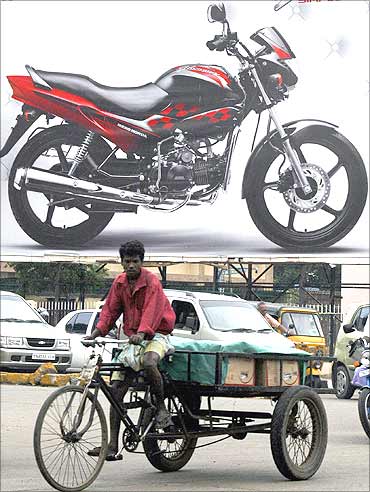
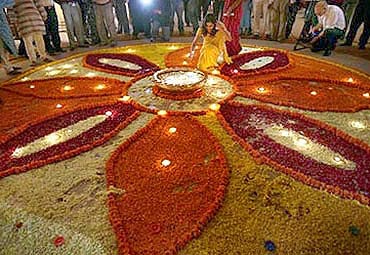


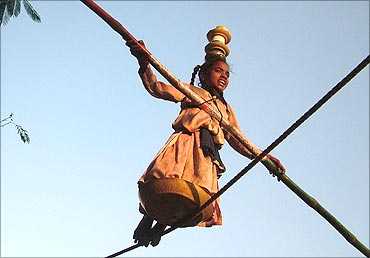


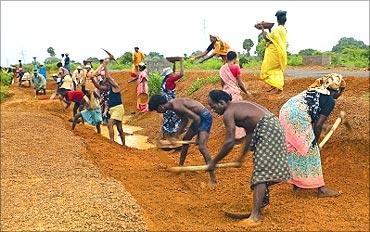
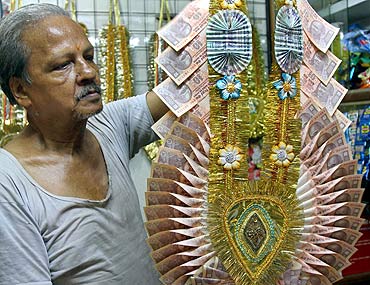
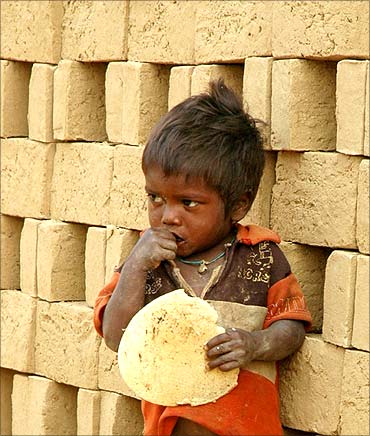

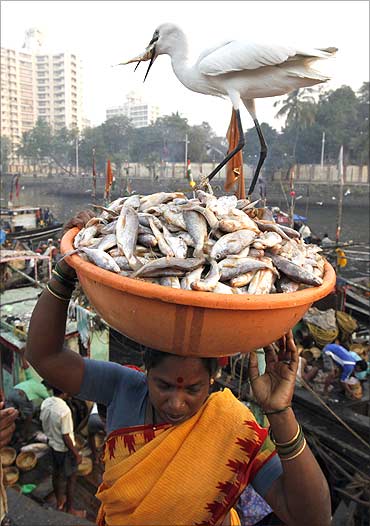
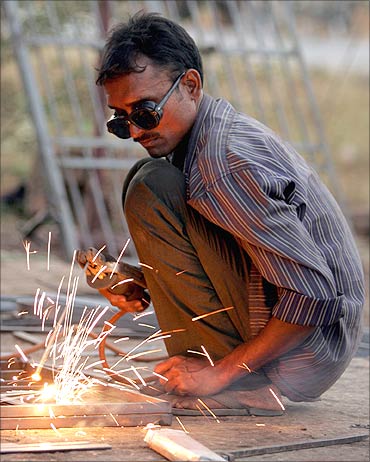
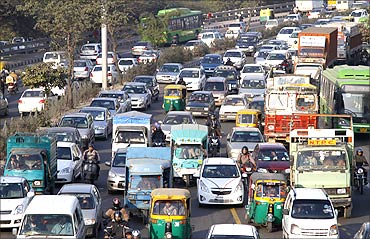
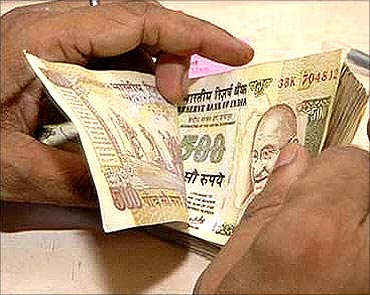
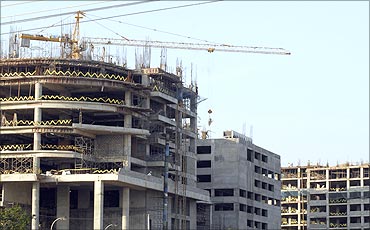
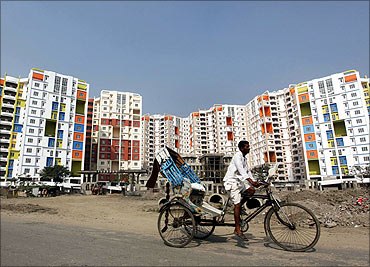
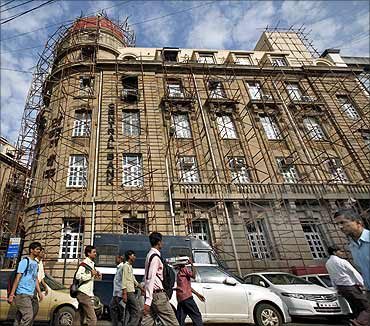
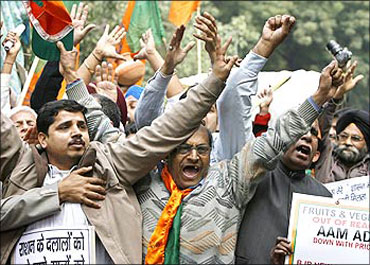

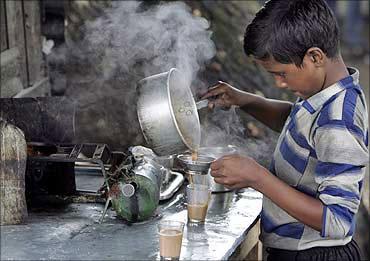
article